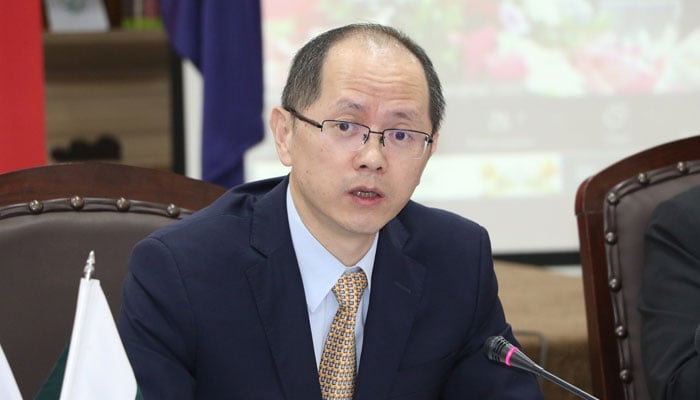‘Terrorist acts can’t undermine Pakistan-China relations’
Islamabad : Shi Yuanqiang, Deputy Head of Mission of Chinese Embassy in Pakistan, has said that that any attempts to undermine cooperation between Pakistan and China by acts of terrorism shall yield no result.
Mr Shi was giving his remarks during Hong Ting Forum Dialogue on “Understanding China-Pakistan all-weather strategic cooperative partnership and Chinese-style modernisation development path” organised here by Institute of Strategic Studies (ISS) in collaboration with Xinhua News Agency.
Mr Shi stated that continuous reforms and opening up is an important step in the development path of China. He added that Premier Li Qiang’s recent visit to Pakistan marks another significant step in strengthening the China-Pakistan all weather strategic cooperative partnership. The leadership of both countries agree on supporting and promoting the Three Initiatives namely the Global Development Initiative, Global Security Initiative, and the Global Civilisation Initiative, in addition to promoting CPEC and people-to-people relations between both countries.
Masood Khalid, former ambassador to China, said that China made significant developments to the world including building the Great Wall, introducing meritocracy and building the great canal system. China’s development journey was marked with the economy growing from $2.286 trillion in 2005 to $18 trillion today. He added that the China-Pakistan relationship is a special high priority relation and any attempts to sabotage it is bound to fail.
Jiang Chao, Bureau Chief Xinhua News Agency, stated that under the strategic guidance of the leaders of both countries, the China-Pakistan friendship has stood the test of time. He added that comprehensive reform and promoting the Chinese style modernisation under the 18th CPC Central Committee has led to a new milestone. This has also facilitated strengthening the China Pakistan All Weather Strategic Cooperative Partnership.
Mudassar Iqbal, Deputy Director, Associated Press of Pakistan, commended China’s people centered approach to modernisation which resulted in the fruits of growth reaching the people. Pakistan also aspired to follow a similar path to modernisation and development. Furthermore, China’s sustainable and ecological development is also a guiding beacon that can serve as a model for developing nations including Pakistan. Dr Salma Malik from Quaid-i-Azam University, stated that the Chinese modernisation is rooted in Deng Xiaoping’s cardinal principles which included rejuvenation of the Chinese nation, strengthening China’s global position, envisioning a new type of the development of Communist Party’s own principles. She said that the cardinal principles create harmony between nature and humanity which is reflected in the greening of CPEC and BRI projects.
Dr Hassan Daud Butt from Bahria University stated that the CPEC remains the buckle of the belt in the Belt and Road Initiative, where CPEC is still the most inclusive, vital and progressive of all BRI corridors. Developing countries can also walk the Chinese path to middle and higher income levels by following the Chinese model of development and modernisation.
-
 Jennifer Garner Drops Parenting Truth Bomb On Teens With Kylie Kelce: 'They're Amazing'
Jennifer Garner Drops Parenting Truth Bomb On Teens With Kylie Kelce: 'They're Amazing' -
 AI Is Creating More Security Problems Than It Solves, Report Warns
AI Is Creating More Security Problems Than It Solves, Report Warns -
 'Game Of Thrones' Prequel 'A Knight Of The Seven Kingdoms' New Ratings Mark Huge Milestone
'Game Of Thrones' Prequel 'A Knight Of The Seven Kingdoms' New Ratings Mark Huge Milestone -
 Apple Seeks To Dismiss Fraud Suit Over Siri AI, Epic Injunction
Apple Seeks To Dismiss Fraud Suit Over Siri AI, Epic Injunction -
 Delroy Lindo Explains The Crucial Role Of Musical Arts In Setting Up His Career Trajectory
Delroy Lindo Explains The Crucial Role Of Musical Arts In Setting Up His Career Trajectory -
 Timothée Chalamet Reveals How He Manages To Choose The Best Roles For Himself
Timothée Chalamet Reveals How He Manages To Choose The Best Roles For Himself -
 Princesses Beatrice, Eugenie’s Conflict Gets Exposed As Mom Fergie Takes Over The Media
Princesses Beatrice, Eugenie’s Conflict Gets Exposed As Mom Fergie Takes Over The Media -
 Kate Middleton Plays Rock-paper-scissors In The Rain
Kate Middleton Plays Rock-paper-scissors In The Rain -
 Lindsay Lohan On 'confusing' Teen Fame After 'Mean Girls': 'I Should Have Listened To My Mom And Dad'
Lindsay Lohan On 'confusing' Teen Fame After 'Mean Girls': 'I Should Have Listened To My Mom And Dad' -
 Savannah Guthrie Mom Update: 'Today' Show Sees Huge Ratings Boost Amid Search For Nancy Intensifies
Savannah Guthrie Mom Update: 'Today' Show Sees Huge Ratings Boost Amid Search For Nancy Intensifies -
 Hillary Clinton To Testify In Epstein Probe Alongside Bill Clinton
Hillary Clinton To Testify In Epstein Probe Alongside Bill Clinton -
 Meghan Markle, Prince Harry End Jordan Trip With Meaningful Hospital Visit
Meghan Markle, Prince Harry End Jordan Trip With Meaningful Hospital Visit -
 AI Boyfriends Gain Popularity In China As Young Women Turn To Virtual Romance
AI Boyfriends Gain Popularity In China As Young Women Turn To Virtual Romance -
 Prince William Receives Reality Check As His Media Strategy Fails
Prince William Receives Reality Check As His Media Strategy Fails -
 Zach Braff Reflects On Doing Odd Jobs Ahead Of Major Career Breakthrough In 2001's 'Scrubs'
Zach Braff Reflects On Doing Odd Jobs Ahead Of Major Career Breakthrough In 2001's 'Scrubs' -
 Google Rolls Out Nano Banana 2 With 4K AI Image Generation
Google Rolls Out Nano Banana 2 With 4K AI Image Generation




